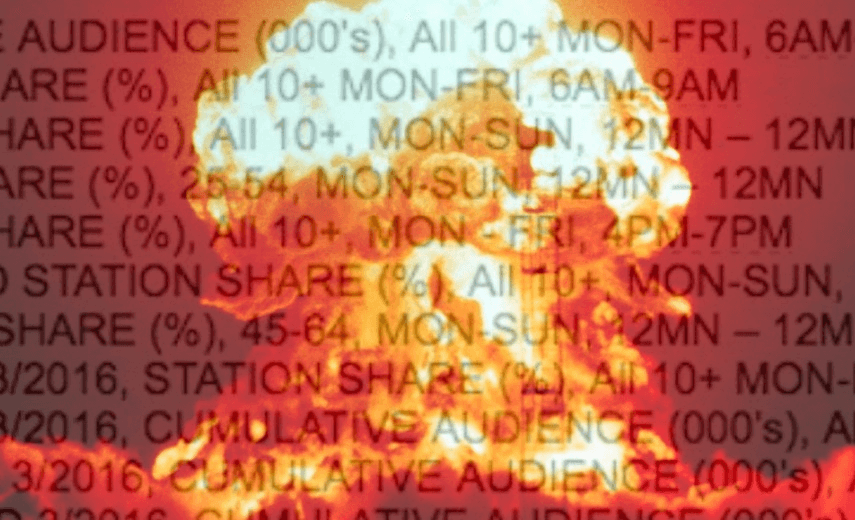As we brace ourselves for more hyperbolic post-radio survey self-congratulations, Henry Oliver talks to MediaWorks’ Leon Wratt, who argues it’s time for the radio networks to end the arms race and start reporting on the results even-handedly – for the good of all radio.
It’s almost that time of the year again – or, now, one of multiple times a year – when the GfK’s New Zealand radio survey results are released and… everyone wins, everyone is the best, and everyone, somehow, has the most listeners! Just a few months ago, Duncan Greive surveyed the radio world’s public relations output from the last radio survey and found the whole thing “brazenly obfuscatory”.
“EVERY NZME STATION INCREASES LISTENERS”, NZME screamed.
“MEDIAWORKS RADIO REMAINS THE NUMBER ONE RADIO NETWORK IN NEW ZEALAND WITH ITS LARGEST EVER REACH,” MediaWorks bellowed.
“Record Audiences for RNZ after latest Radio Survey,” RNZ said, probably in a calm and ever-so-slightly British tone.
This is what happens every time a radio survey is released (which is increasing at such a pace that, in a few years, we may be living in a constant revolving radio survey). Every media conglomerate reports on its own success, and does its best not to mention any competing station or show, other than when it can unequivocally say that said station or show is being crushed by the reporting conglomerate’s station or show.
Sound fun? It’s not.
As a listener, it’s boring to hear about. As an advertiser, you know how to actually read the results so are unlikely to be impressed with the all-caps press releases. And, as a competing media outlet, you know how these things work and are appropriately cynical about the whole thing.
And it’s only getting worse. With the release of every survey, the proclamations of sector domination are getting hyped beyond mere hyperbole. According to Leon Wratt, group content director at MediaWorks, the post-survey chest beating is becoming an arms race that is overshadowing the narrative the radio networks should be pushing: that radio is not only surviving but thriving in the age of the internet, continually growing both its audience and revenue in a time when nearly all other forms of media are struggling to wrest whatever dollars they can away from Facebook and Google.
“Obviously everyone’s looking to push their own amazingness and how well they’ve done,” says Wratt. “But it ends up becoming a bit of a war. And how far down that rabbit hole can we go? It’s like Trump trying to stand up against North Korea.
“In the old days, JayJay, Mike and Dom would get on the air and say ‘Hey! Wow! We’ve got all these listeners, thanks so much for listening!’ Which is fine. That, to me, is a natural exuberance you’d expect from people that have worked really hard on achieving a result. Because it is competitive, there’s no doubt about it. But the part that does stick sometimes is when you’ve got media which are owned by the same company only pushing their own results out. And really distorting what’s going on in the market. At that point I think you’ve lost that link between what’s fair and reasonable and good reporting to what just becomes a one-eyed, partisan, only-we-win situation. We should be reporting on radio awards and survey results in a fair and reasonable manner.”
According to Wratt, it’s in everyone’s best interests to tone down the competitive rhetoric and shift the conversation to radio’s collective success – financially and culturally – in the face of digital disruption. “Everyone’s fighting against the internet, but the best thing about radio is that it’s always been able to pivot and adapt to whatever new technologies come along,” he says. “We’ve been disrupted half-a-dozen times in the history of radio – FM coming in, competitors coming in, and then the explosion of frequencies released by the government in the late-90s. Then the internet comes along and we adapt again.”
Wratt says that radio persists as a mobile media because it’s so easy to use and, as opposed to streaming services or podcasts, requires little thought on behalf of the listener. You turn on the car and it’s just there. “People rely on us when it comes to news, weather, all those little things. Everyone’s got their devices and there are lots of different ways to get that information, but just being able to tune in the morning and get a news update, a weather update, a traffic update, a sense of the day, plus hopefully play a few favourite songs – there’s just something really comforting and really easy. People like easy and radio is bloody easy.”
So the fight, he says, shouldn’t be with the competition, but to keep the listeners coming back to radio, when the most profitable companies in the world want them using their products and services instead. “If your listeners aren’t interested in your products, if the listeners aren’t passionately listening every day, that’s where the fight is. The rest of it is superfluous.”
The next radio survey is released this Thursday, 28 September. We’ll have to wait to see if a truce is called or escalation persists.
The Spinoff Media is sponsored by MBM, an award-winning strategic media agency specialising in digital, with vast experience across all channels. We deliver smart, tailored media solutions as well as offering a leading data and analytics consultancy. Talk to us about your communications challenges and how MBM can help bring you success through the power of media and technology.

